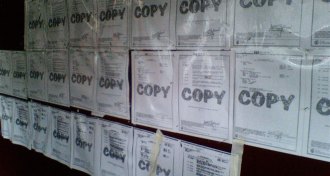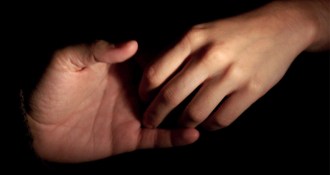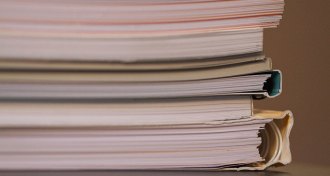Psychology
-
 Psychology
PsychologyKids grasp words as symbols before learning to read
Preschoolers grasp that written words refer to specific things before they learn to read.
By Bruce Bower -
 Psychology
PsychologyAs suicide rates rise, researchers separate thoughts from actions
Advances in suicide research and treatment may depend on separating thoughts from acts.
By Bruce Bower -
 Science & Society
Science & SocietyHow seeing ‘Star Wars’ satisfies your narcissistic tendencies
Participating in geek culture allows self-identified geeks to satisfy a narcissistic need for expert status, a new study hypothesizes.
-
 Science & Society
Science & SocietyIn science, a lack of replication shouldn’t kill your reputation
The proof is science is when a study is replicated. When it’s not, do scientists suffer? A new study says researchers may overestimate the negative effects.
-
 Psychology
PsychologyCulture shapes sense of fairness
Culture shapes kids’ sense of fairness, especially when they get the short end of the stick.
By Bruce Bower -
 Psychology
PsychologyCaffeine gives cocaine an addictive boost
Not only is it popular to “cut” cocaine with caffeine, the combination might be more addictive.
-
 Psychology
PsychologyNo, cheese is not just like crack
Recent news reports claimed that a study shows cheese is addictive. But the facts behind the research show cheese and crack have little in common.
-
 Anthropology
AnthropologySynchronized dancing boosts pain tolerance
Dancing in sync to high energy routines increase pain tolerance and helps people bond as a group, a study suggests.
-
 Psychology
PsychologyViews on bias can be biased
When presented with a study showing bias against women, male scientists are more inclined to nitpick the results. But a little intervention can go a long way toward gender equality in science.
-
 Psychology
PsychologyPeople find the skin of others’ softer than their own
Humans perceive other peoples’ skin as softer and smoother than their own because touch is important in social bonding, researchers suggest.
-
 Science & Society
Science & SocietyWhy enforced ‘service with a smile’ should be banned
If management wants workers to maintain false cheer, those workers should be trained, supported and compensated for the emotional labor, a new review suggests.
-
 Psychology
PsychologyPsychology results evaporate upon further review
Less than half of psychology findings get reproduced on second tries, a study finds.
By Bruce Bower